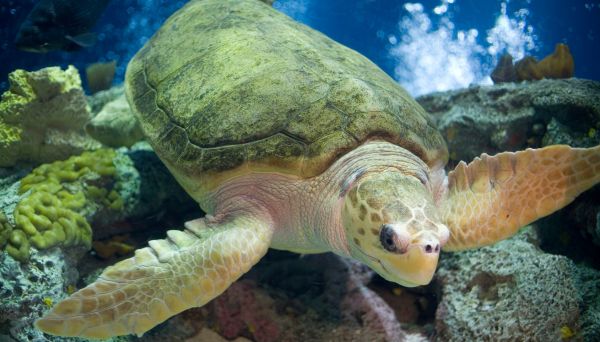CEC Publishes Factual Record on the Effective Enforcement of Environmental Law Related to Submission SEM-20-001 (Loggerhead Turtle)
Tiohtià:ke (Montreal), 22 April 2024 — Today the Secretariat of the Commission for Environmental Cooperation (CEC) published the factual record regarding submission SEM-20-001 (Loggerhead Turtle), filed on 17 December 2020 by the Mexican Center for Environmental Law A.C. (Centro Mexicano de Derecho Ambiental, Cemda) and the U.S.-based Center for Biological Diversity (“the Submitters”), in which it is asserted that Mexico was failing to effectively enforce its environmental laws with respect to conservation of the loggerhead turtle (Caretta caretta) in the Gulf of Ulloa, Baja California Sur, Mexico.
According to the Submitters, there are reports of increasing loggerhead turtle mortality due to fishing bycatch in the region, despite the designation of a refuge area for the species in 2018, which indicates a failure to effectively enforce environmental laws.
On 3 April 2023, CEC Council members instructed the Secretariat to prepare this factual record, specifically covering: 1) the asserted failure to file criminal complaints with the Office of the Attorney General of the Republic (Fiscalía General de la República—FGR) for the death of loggerhead turtle specimens; 2) the number of inspection and surveillance visits to the area annually, as well as the imposition of administrative sanctions; 3) the promotion and development of conservation activities; and 4) the effectiveness of instruments to reduce bycatch, as well as the asserted lack of mechanisms to review the measures implemented.
The factual record provides information about the loggerhead turtle and contains extensive data on loggerhead turtle mortality in the Gulf of Ulloa since 2010. According to the Federal Attorney on Environmental Protection (Procuraduría Federal de Protección al Ambiente—Profepa), there were more than 200 deaths of loggerhead turtles in 2012, 2013, 2018, 2019 and 2020 based on stranding data. Regarding potential causes of mortality such as fishing bycatch, hypothermia, marine debris, contaminants in foraging areas, etc., in analyzing the available information, the Secretariat found that “there is no single hypothesis or a combination of hypotheses explaining the mortality rate of C. caretta, mainly due to the absence of long-term continuity in the available assessments.”
The Secretariat found no information supporting the filing of criminal complaints before FGR regarding the deaths of loggerhead turtles in the Gulf of Ulloa.
Regarding the number of inspections conducted by Profepa, the Secretariat found that one inspection was conducted in 2010; 287 inspections in 2013 (when nearly 1,000 loggerhead turtles were recorded as stranded on San Lázaro beach) and 399 inspections in 2014. From 2015 onward, the number of inspections conducted by Profepa started to decrease.
With respect to the protection of the loggerhead turtle, the factual record provides information on the implementation of the following programs:
- Comprehensive Fisheries Zoning Plan for the Gulf of Ulloa, Baja California Sur (Programa integral de ordenamiento pesquero en el golfo de Ulloa, Baja California Sur)
- Fisheries Management Plan (Plan de Manejo Pesquero)
- Loggerhead Turtle Conservation Action Plan (PACE-C. caretta)
- Species at Risk Conservation Plan (Programa de Conservación de Especies en Riesgo)
- North Pacific Marine and Regional Ecological Zoning Plan (Programa de Ordenamiento Ecológico Marino y Regional del Pacífico Norte) (“POEMR-North Pacific”)
- the On-board Technical Assistance Program (Programa de Asistentes Técnicos a Bordo—OTA Program)
With respect to the POEMR-North Pacific in 2021, new ecological criteria, which could trigger the suspension of fishing activity in the region, were submitted for public consultation. The proposed criteria, established as a triggering factor, reduced the incidental catch limit of loggerhead turtles in the Gulf of Ulloa, from 200 to a maximum of 90 dead specimens per year, a threshold that when reached meant that fishing is to be suspended throughout the region until the following year. The executive committee of the POEMR-North Pacific eliminated this threshold in 2023.
Regarding the OTA Program, it provided for individuals who would accompany and monitor smaller fishing vessels in the Gulf of Ulloa. Between 2015-2018, technical assistants were on board for a total of 24,313 trips of vessels from the coastal fleet in the Gulf of Ulloa. During this period, a total of 908 loggerhead turtles were observed in the ocean – 865 live and 43 dead (floating in the water, without the cause of death having been ascertained). Additionally, 126 interactions between C. caretta and fishing gear were recorded, of which 27 resulted in specimens killed as bycatch.
USMCA/CUSMA Article 24.28(7) directs the Environment Committee to consider the final factual record in light of the objectives of Chapter 24 and states that the Committee may provide recommendations to the CEC Council on whether the matter raised in the factual record could benefit from cooperative activities.
The full text of the factual record, including background information on the submission is available on the Public Registry of Submissions page for SEM-20-001 (Loggerhead Turtle) on the CEC website. Mexico may provide updates on the final factual record in accordance with USMCA/CUSMA Article 24.28(8).

The report released today addresses conservation actions to protect the loggerhead turtle (Caretta caretta) in the Gulf of Ulloa, Baja California Sur, Mexico and is the first factual record under the Submissions on Enforcement Matters process in Chapter 24 of the United States-Canada-Mexico Agreement.
The CEC SEM Process
The CEC Submissions on Enforcement Matters process supports public participation, information-sharing between governments and the public, and transparency and openness in the effective enforcement of environmental law in North America. If you have reason to believe that an environmental law is not being effectively enforced by Canada, Mexico or the United States, the SEM process may address your concerns.
As of 1 July 2020, the CEC’s SEM process is governed by USMCA Articles 24.27 and 24.28 of the Environment Chapter of the free trade agreement between Canada, Mexico and the United States (CUSMA, T-MEC, USMCA).
Want to learn more about the SEM process? Please watch this two-minute video for an introduction: